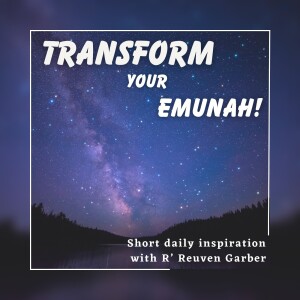
Friday Dec 06, 2024
204 - Your Crown
As we've discussed many times, the cornerstone and foundation of the whole Torah and of what it means to be a Jew, is emunah. And as many Torah commentaries discuss, that a kind of synonym with emunah and certainly one of the main focuses that a life of emunah should lead to is prayer - tefillah. When it comes to isolated mitzvos, which are all of paramount importance, usually there is a set of laws that outline to us exactly how to perform this particular mitzvah. When it comes to emunah, because it is such a foundation and ultimately everything we are doing boils down to it, there are so many details in what it means to have emunah that in a sense one can continue to learn more and more about it throughout one's life.
And in a similar vein, when it comes to tefillah, there's so much Torah literature available about it that again, it is a lifetime's work. The Midrash Rabbah to Parshas Beshalach section 21 states that the angel appointed over the prayers of the Jewish people collects the prayers, makes crowns out of them, and then places them on Hashem's head. Let us appreciate that whenever we talk to Hashem, even about the most mundane matters, we are actually sending Him a gift that makes up the crown that He wears. Each word of prayer that we utter is really the holy of holies and therefore Hashem chooses to wear these prayers on His head constantly. This is one of many tremendously motivating Torah sources that help us to treat prayer with highest priority.
The Talmud Yerushalmi in Brochas chapter 9 states that Hashem is close to us and attentive to our prayers. The Gemara goes on to compare the manner in which Hashem hears us to one who speaks into the ear of another individual. Just like the individual hears us loud and clear, so too does Hashem hear every word loud and clear. There are many levels to what it means to have emunah. For many of us who believe that Hashem is there, we believe that He listens when we talk to Him. However, there are many levels to what it means to believe that Hashem is truly listening to me. This passage is teaching us that Hashem listens to every single word we are saying just like you would be whispering into the ear of another individual, to that extent and more because He is not limited by human capacity.
Taking Torah passages like this to heart will motivate us to treat our personal prayer with Hashem with maximum importance. The Zohar HaKadosh to Parashat Vayishlach page 169a states that we should make effort to express our prayers to Hashem clearly to the best of our abilities. We should not assume that Hashem understands what we mean without the need for us to express our requests adequately; but rather, we should imagine that we are talking to another individual who needs us to explain all the details of what we are saying. Of course Hashem understands what we are going to say even before we say it, and were we to be in a situation such as having an inability to talk, we certainly could be rest assured that Hashem knows exactly what we mean even without us having expressed ourselves adequately. However, this Torah passage is teaching us that Hashem's desire is that we do make our maximum effort in expressing ourselves in our prayers with all the precise details.
"Thank you Hashem for teaching me that when I pray to you it is so important to you that you take those prayers and actually put them on the crown that is on your head. Thank you also Hashem for teaching me that you are listening so closely to everything I have to say as if I am talking directly into your ear. And thank you Hashem also for outlining to me that the right way to pray is to make my maximum effort to adequately express myself even though in truth you don't need me to because you know everything, this is your desire and this is the mitzvah of what it means to pray to you. Thank you Hashem for the gift of tefillah."
No comments yet. Be the first to say something!